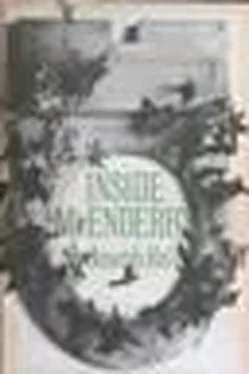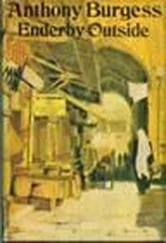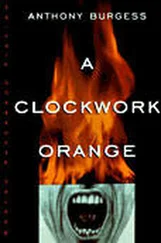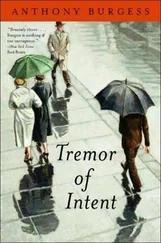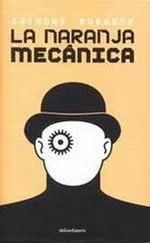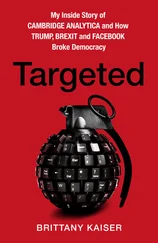For, when a note was struck, we knew its name."
"Good," said Enderby. "This is the first time I've ever actually heard -"
"- That dark aborted any urge to tame
Waters that day might prove to be a ditch
But then were endless growling ocean, rich
In fish and heroes, till the dredgers came."
"Excellent," said Enderby. "And now the sestet." It excited him to hear his own verses. She went on confidently:
"Wachet auf! A fretful dunghill cock
Flinted the noisy beacons through the shires;
A martin's nest clogged the cathedral clock,
But it was morning (birds could not be liars).
A key cleft rusty age in lock and lock;
Men shivered by a hundred kitchen fires.
There," she said, taking breath. "But I've no real idea what it means."
"Oh," said Enderby, "the meaning doesn't matter all that much. I'm surprised at your liking that. It's not what I'd thought of as a woman's poem." Suddenly the poem seemed to find its place in the real world-overseas businessmen reading financial papers, the scent of Miss Dior or whatever it was, the noise of London waiting to pounce outside the hotel. Spoken by her, it seemed suddenly to have a use.
"And what exactly do you mean by a woman's poem?" asked Mrs Bainbridge.
"For you," said Enderby with disarming candour, "something softer and yet more elegant, something with less harshness and thought and history in it. That, you see, is about the Middle Ages and the coming of the Reformation. In the sestet you get Martin Luther and the beginning of dissolution, everybody beginning to be alone, a common tradition providing no tuning-fork of reference and no way of telling the time, because the common tradition has been dredged away. Nothing sure and nothing mysterious."
"I see," said Vesta Bainbridge. "I take it you're a Catholic, then."
"Oh, no, no," protested Enderby. "I'm not, really I'm not."
"All right," said Vesta Bainbridge, smiling. "I heard you the first time." Protestant Enderby grinned and shut up. The Roman waiter came along, chewing gently but mournfully, with a bill. "For me," she said, and notes rustled in her bag like pork crackling. She paid the bill and, womanly, tipped the waiter merely adequately. Enderby said:
"I'd ask you to dine with me this evening, but I've just realized that I didn't bring very much money. I expected, you see, that I'd go straight back after lunch. I'm awfully sorry."
"Don't be," smiled Vesta Bainbridge. "I'm invited out. Somewhere in Hampstead. But it was nice of you to offer. Now," she said, looking at her tiny oyster watch, "goodness, the time, where do I write to?" She took out a small notebook and poised a pencil to record what Enderby dictated. Somehow, the address seemed vulgar and even comic, endited primly by that slim hand. 81 Fitzherbert Avenue. He tried to hide from her the sound of the lavatory's flush, the crusted milk-bottles on the doorstep, the mice scampering through the manuscripts. "Good," she said, closing the book. "Now I must go." She settled the ocelot over her shoulders, clipped her bag shut. Enderby stood. She stood. "It's been awfully nice," she said. "Oh, that's inadequate. But it's been quite a privilege, really it has. Now I really must fly." She gave him an unexpected handshake, straight from the elbow. "Don't bother to come to the door," she said. Then she was off, trimly and swiftly walking a tightrope across the carpet. For the first time Enderby caught a hint of colour of her hair, upswept at the nape, a sort of penny-colour. He sighed, and turned to see the waiter looking at him. The waiter made a gesture-quick frog-mouth, shrug-to indicate (a) that she was certainly elegant but much too thin, (b) that she was off to meet somebody handsomer than Enderby, (c) that women were fundamentally ungenerous, (d) that this was a hell of a life but there were always the consolations of philosophy.
Enderby nodded, the poet at ease with all classes of men, then realized with joy that he was once more alone and free. The wind that blew through him celebrated this fact.
Enderby was late returning home that evening. Though his perversely independent soul-the conscious Enderby shocked and gaping-had rejected the sweets of recognition, he felt that he and London had achieved more of a rapprochement than he could have thought possible, scratching paper and bared legs, the day before. A smart and worldly woman admired his work and had said so frankly. Lips that had been kissed by a prominent racing-driver and, Enderby presumed, by others whose teeth habitually gleamed at cameras, had recited from the Revolutionary Sonnets in a rich-smelling place whose denizens had passed beyond the need for the solace of poetry. Enderby, wandering the streets, was restless and had an obscure longing for adventure. Here the snow had long disappeared, but the tang of snow on the air bit sharply from the furthermost stretch of the river. London yearned back to gasflares and geese sold cheap at the end of the trading day amid raucous Cockney voices, Sherlock Holmes in Baker Stret, a widow at Windsor, all's right with the world. That was from Pappa Pisses. Enderby grinned sadly to himself, standing outside a music-shop, as he remembered the disastrous lecture he had once given to a Women's Institute. Victorian Literature. That was one spoonerism that his audience had passed over. But A Sale of Two Titties had struck Lady Fennimore as something like calculated insolence. Never again. Never, never again. He was safer in retirement, shut away in his creative lavatory. But still, this one evening, the desire for adventure was strong. Yet what did one mean by adventure these days? He gazed at the shop-window, as if for an answer. Various pictures of young louts sneered out at him from song-covers and record-sleeves-simian-foreheaded, prehensile fingers on guitar-strings, lips twisted in a song of youth. Enderby had heard of secondary modern schools and now assumed that these flat-eyed little monsters must represent their end-product. Well, for two guineas a week he was going to serve the world that these loose-lipped leerers served. What was the name of the magazine again? Film or Flam or something. Not Phlegm, that was quite certain. Within the consonantal frame he tried out various vowels. And there, next door but one, outside one of Sir George Goodby's own shops, a poster put him right: "Exclusive to Fem, FOR YOU, Lenny Biggs tells his own personal life story. Order your copy NOW." And there was a picture of Lenny Biggs-a face hardly distinguishable from others of the pantheon Enderby had just viewed, though perhaps more particularly baboon-like than generally simian, with teeth as manifestly false as those of Enderby himself, sniggering with confidence at the world.
Enderby saw a man in a peaked cap dump a couple of parcels in a van lettered GOODBY'S FOR GOOD BOOKS. This van then started up contemptuously and insolently pierced the traffic. "So," thought Enderby, "Sir George has already started his reprisals, has he? All copies of Enderby's poems to be withdrawn from sale, eh? Petty, a very petty-minded man." Enderby entered the shop and was depressed to see people buying gardening books. Display studio-portraits of groomed youthful bestsellers topped piles of their bestselling novels. Enderby felt that he wanted to flee; this was as bad as reading Sunday reviews. And, to brim his misery, he realized that he had maligned Sir George: two soiled Enderby volumes sulked there on the unvisited poetry shelves. He was beneath the notice of that wealthy knight, too mean for the meanness of retaliation. Oh, well. The name Rawcliffe suddenly hurled itself, along with a pang of dyspepsia, at Enderby's breastbone. In all the anthologies, did he say? Enderby would see.
Читать дальше
